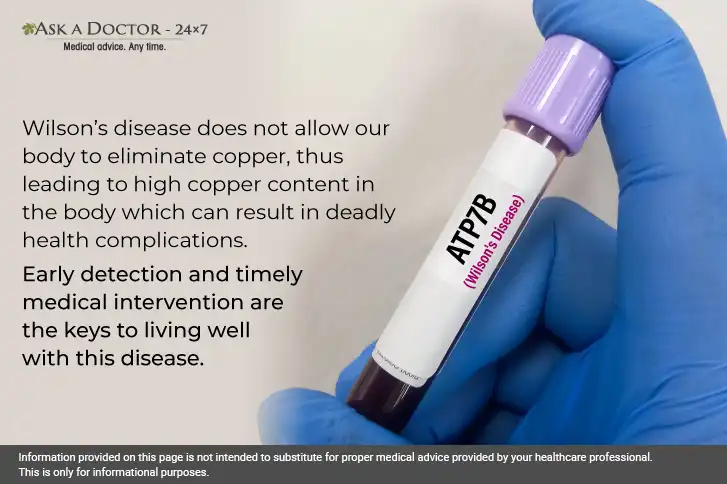All About Wilson's Disease And Its Management!
Wilson disease is a genetic disorder that causes copper levels to accumulate in several body organs, especially in the liver, brain, and eyes. Without treatment, excess copper levels in the body could have life-threatening consequences.
Read the blog to know everything about Wilson’s disease in detail…
What Happens to Your Body in Wilson’s Disease?

Being a relatively rare genetic disorder, Wilson’s disease does not allow our body to eliminate copper, thus leading to high copper content which can result in deadly health complications.
The excessive copper build-up in the body can damage certain body organs including the liver, nervous system, brain, kidneys, and eyes. If left untreated, Wilson's disease can be fatal.
Although there is no cure for this disease, it can be managed with timely medical intervention.
Identify the Signs and Symptoms of Wilson’s Disease
Signs and symptoms depend on the area affected usually the liver, brain, and other organs. However, the most commonly observed symptoms are:
- Constant fatigue and low energy
- Loss of appetite
- A pale yellow color of skin and whitish color of the eyes known as jaundice.
- Anxiety, depression, and mood swings
- Fluid buildup especially in the legs and abdomen
- Golden brown or copper-colored rings around the irises of the eyes
- Uncontrolled coordination of body movements
What are the Complications Associated With Wilson's Disease?
When left unattended, Wilson's disease can cause severe health complications such as:
- Liver diseases like hepatitis, cirrhosis or necrosis
- Repetitive, multiple infections
- Spleen disorders
- Muscle atrophy
- Increased susceptibility to bone fractures
- Permanent physical disability
- Permanent intellectual disability
- If left untreated, it can lead to death
How to Diagnose Wilson’s Disease?
A doctor may prescribe the following examination tests to diagnose Wilson's disease:
- Blood and Urine Examination: Both blood and urine examination is done to monitor liver function and check the amount of copper present in the blood as well as in urine. In the blood test, the level of a protein called ceruloplasmin – which binds copper in the blood, is assessed.
- Eye Test: In this test, your eyes are examined for Kayser-Fleischer rings, which are caused by extra copper in the eyes.
- Liver Biopsy: In a biopsy, a doctor inserts a thin needle through the skin into your liver to draw a small sample of tissue and test it for extra copper content.
- Genetic Examination: If your blood test results show the presence of any changed gene that causes Wilson's disease, then doctors may suggest screening your siblings, even if they do not display any symptoms of Wilson’s disease.
To know further about Wilson's disease you can Ask a Nephrologist online.
How Can Wilson’s Disease Be Managed?
The treatment options for Wilson’s disease include medications, chelation therapy, and dietary modifications that insist on avoiding copper-rich foods. Read on…
Medication-Wise
A lifetime treatment is necessary to manage this deadly disease. The treatment options include:
- Undergoing copper chelating medication as per the doctor's advice
- Taking zinc supplementation per prescription. Zinc is helpful for the absorption of extra copper from the diet and also prevents copper buildup in the body.
- Managing any damage to your liver and nervous systems – on time.
- If your Wilson’s disease leads to acute liver disease or liver cirrhosis with liver failure, then you may require a liver transplant
Lifestyle Wise
To live well with Wilson's disease you need to practice a lifetime modification in your dietary habits as well as in certain other aspects of your lifestyle. Let’s understand them:
Dietary modifications:
Your doctor may recommend a copper-restricted diet to live well with Wilson’s Disease. Some of the foods that you will need to eliminate from your daily diet are:
- Organ meat especially liver, brain
- Shellfish
- Mushroom
- Chocolate
- Nuts and seeds
- Dried beans to name a few
You can consult a dietician online to learn about other foods that contain copper and ask for an individualized diet plan for Wilson’s disease.
Other lifestyle modifications:
Along with dietary modifications, you must avoid cooking as well as eating your food with any copper utensils. Also, you must replace copper-made water pipes and use a water filter to remove the amount of copper from the drinking water.
When You Need to Visit a Doctor
If you have a family history of Wilson’s disease or you have noticed any symptoms related to this disease, visit your doctor or any health care provider immediately. Remember early detection can make a big impact on your treatment and may help to diminish the severity of the disease.
Conclusion
People with Wilson's disease need lifetime care and medical attention. Early detection and immediate medical support are highly crucial for better outcomes in this disease. Therefore, one must stay attentive toward follow-ups with a doctor and dietician to avoid the life-threatening complications and severity associated with this disease.
If you want to get individualized guidance on dietary modifications related to Wilson’s disease or any other nutritive concern then you can Ask a Dietician online at Ask a Doctor 24x7.
Recently Answered Questions Related to Wilson’s Disease
- What Treatment Is Suggested For Wilson S Disease?
- How To Ascertain Whether I Am Infected With Hepatitis Or Not?
- Can Neutropenia Cause Increase Liver Tests?
- What Does My Liver Function Test Report Indicate?
- Is Back Pain In IUD Patients Due To Copper Inserted Or A Wilson S Disease Symptom?
- What Causes Pain In The Chest Post Gallbladder Removal?
- Suggest Treatment For Liver Cirrhosis
- Suggest Treatment For Variceal Bleeding And Loss Of Appetite
Disclaimer: Information provided on this page is not intended to substitute for proper medical advice provided by your healthcare professional. This is only for informational purposes.
Ask a Specialist
Recent Questions


